How to create a financial forecast for a management consulting firm?
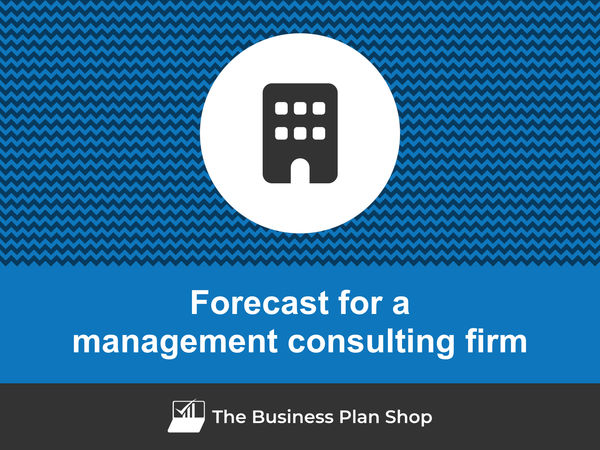
If you are serious about keeping visibility on your future cash flows, then you need to build and maintain a financial forecast for your management consulting firm.
Putting together a management consulting firm financial forecast may sound complex, but don’t worry, with the right tool, it’s easier than it looks, and The Business Plan Shop is here to guide you.
In this practical guide, we'll cover everything you need to know about building financial projections for your management consulting firm.
We will start by looking at why they are key, what information is needed, what a forecast looks like once completed, and what solutions you can use to create yours.
Let's dive in!
Why create and maintain a financial forecast for a management consulting firm?
In order to prosper, your business needs to have visibility on what lies ahead and the right financial resources to grow. This is where having a financial forecast for your management consulting firm becomes handy.
Creating a management consulting firm financial forecast forces you to take stock of where your business stands and where you want it to go.
Once you have clarity on the destination, you will need to draw up a plan to get there and assess what it means in terms of future profitability and cash flows for your management consulting firm.
Having this clear plan in place will give you the confidence needed to move forward with your business’s development.
Having an up-to-date financial forecast for a management consulting firm is also useful if your trading environment worsens, as the forecast enables you to adjust to your new market conditions and anticipate any potential cash shortfall.
Finally, your management consulting firm's financial projections will also help you secure financing, as banks and investors alike will want to see accurate projections before agreeing to finance your business.
Need a convincing business plan?
The Business Plan Shop makes it easy to create a financial forecast to assess the potential profitability of your projects, and write a business plan that’ll wow investors.

What information is used as input to build a management consulting firm financial forecast?
A management consulting firm's financial forecast needs to be built on the right foundation: your assumptions.
The data required to create your assumptions will depend on whether you are a new or existing management consulting firm.
If you are creating (or updating) the forecast of an existing management consulting firm, then your main inputs will be historical accounting data and operating metrics, and your team’s view on what to expect for the next three to five years.
If you are building financial projections for a new management consulting firm startup, you will need to rely on market research to form your go-to-market strategy and derive your sales forecast.
For a new venture, you will also need an itemised list of resources needed for the management consulting firm to operate, along with a list of equipment required to launch the venture (more on that below).
Now that you understand what is needed, let’s have a look at what elements will make up your management consulting firm's financial forecast.
The sales forecast for a management consulting firm
From experience, it is usually best to start creating your management consulting firm financial forecast by your sales forecast.
To create an accurate sales forecast for your management consulting firm, you will have to rely on the data collected in your market research, or if you're running an existing management consulting firm, the historical data of the business, to estimate two key variables:
- The average price
- The number of monthly transactions
To get there, you will need to consider the following factors:
- Client demand: The level of demand for management consulting services can greatly impact the average price and number of monthly transactions for your firm. If there is a high demand for your services, you may be able to charge higher prices and see an increase in the number of transactions. On the other hand, if demand is low, you may need to lower your prices in order to attract clients and maintain a steady stream of transactions.
- Industry trends: Keep an eye on trends within the management consulting industry, as they can have a significant impact on your average price and number of monthly transactions. For example, if there is a growing trend towards digital consulting services, you may need to adjust your prices and offerings in order to stay competitive and attract clients.
- Economic conditions: The state of the economy can also affect your sales forecast. In times of economic downturn, businesses may be more hesitant to invest in management consulting services, leading to a decrease in both price and number of transactions. Conversely, during periods of economic growth, businesses may have more resources to allocate towards consulting services, leading to an increase in both price and transactions.
- Competition: The level of competition in the management consulting market can also impact your average price and number of monthly transactions. If there are many other firms offering similar services, you may need to lower your prices in order to remain competitive. On the other hand, if you have a unique offering or niche, you may be able to charge higher prices and see an increase in transactions.
- Industry regulations: Keep an eye on any changes in regulations or laws within the management consulting industry. These can impact your pricing strategy and the number of transactions you are able to complete. For example, if new regulations require additional certifications or training for consultants, this may increase your costs and in turn, lead to higher prices for your services.
Once you have an idea of what your future sales will look like, it will be time to work on your overhead budget. Let’s see what this entails.
Need a convincing business plan?
The Business Plan Shop makes it easy to create a financial forecast to assess the potential profitability of your projects, and write a business plan that’ll wow investors.

The operating expenses for a management consulting firm
The next step is to estimate the costs you’ll have to incur to operate your management consulting firm.
These will vary based on where your business is located, and its overall size (level of sales, personnel, etc.).
But your management consulting firm's operating expenses should normally include the following items:
- Staff Costs: This includes salaries, benefits, and any other expenses related to your employees. As a management consulting firm, your staff is your most valuable asset, so it is important to budget for their compensation and any associated expenses.
- Accountancy Fees: As a business owner, you understand the importance of accurate financial records. Hiring an accountant or accounting firm to handle your bookkeeping, tax filings, and financial statements is a necessary expense for your management consulting firm.
- Insurance Costs: Protecting your business and employees from potential risks and liabilities is crucial. This may include general liability insurance, professional liability insurance, and workers' compensation insurance.
- Software Licenses: In order to effectively manage and analyze data, you will need to invest in software licenses. This may include project management software, data analysis tools, and other industry-specific software.
- Banking Fees: Your management consulting firm will likely have multiple financial transactions, such as paying employees, collecting payments from clients, and managing expenses. As a result, you can expect to incur banking fees for services such as wire transfers, check printing, and account maintenance.
- Marketing and Advertising: In order to attract new clients and maintain a strong reputation, marketing and advertising are crucial for your management consulting firm. This may include expenses for website development, social media advertising, and attending industry events.
- Office Rent: Whether you have a physical office space or work remotely, you will need to budget for office rent or other expenses such as co-working space fees. This will also include utilities and maintenance costs.
- Travel Expenses: As a management consulting firm, you may need to travel to meet with clients or attend industry conferences. This will include expenses such as airfare, hotel accommodations, and meals.
- Professional Development: In order to stay current with industry trends and best practices, you and your employees may need to attend training courses or conferences. Budgeting for professional development is important for the growth and success of your firm.
- Supplies and Equipment: Your management consulting firm will likely require office supplies such as paper, ink, and pens, as well as equipment such as computers, printers, and office furniture.
- Legal Fees: As a business owner, you may need to seek legal advice for various matters such as contracts, intellectual property protection, or employment law. Budgeting for legal fees is necessary to protect your business.
- Taxes: As a business owner, you are responsible for paying various taxes, such as income tax, sales tax, and payroll taxes. It is important to budget for these expenses to avoid any penalties or fines.
- Employee Benefits: In addition to salaries and wages, you may offer your employees benefits such as health insurance, retirement plans, and paid time off. These costs should be factored into your operating expenses.
- Rent or Mortgage Payments: If you own a physical office space, you will need to budget for rent or mortgage payments. This is a significant expense for your management consulting firm and should be carefully planned for.
- Client Entertainment: Building relationships with clients is important for the success of your management consulting firm. This may include expenses for client lunches, dinners, and other forms of entertainment.
This list is not exhaustive by any means, and will need to be tailored to your management consulting firm's specific circumstances.
What investments are needed to start or grow a management consulting firm?
Once you have an idea of how much sales you could achieve and what it will cost to run your management consulting firm, it is time to look into the equipment required to launch or expand the activity.
For a management consulting firm, capital expenditures and initial working capital items could include:
- Office equipment: This includes items such as computers, printers, and furniture that are necessary for day-to-day operations in a management consulting firm.
- Software: Management consulting firms often require specialized software for project management, data analysis, and other purposes. These software programs can be expensive and may need to be upgraded or replaced regularly.
- Office space: The cost of office space is a significant capital expenditure for a management consulting firm. This includes rent, utilities, and any renovations or improvements needed to create a professional and functional workspace.
- Training and development: While training and development expenses are typically considered operating expenses, certain types of training, such as leadership development programs or specialized certifications, may be considered capital expenditures for a management consulting firm.
- Technology infrastructure: A management consulting firm may need to invest in technology infrastructure, such as servers and networking equipment, to support their operations and ensure secure data management.
Again, this list will need to be adjusted according to the specificities of your management consulting firm.
Need a convincing business plan?
The Business Plan Shop makes it easy to create a financial forecast to assess the potential profitability of your projects, and write a business plan that’ll wow investors.

The financing plan of your management consulting firm
The next step in the creation of your financial forecast for your management consulting firm is to think about how you might finance your business.
You will have to assess how much capital will come from shareholders (equity) and how much can be secured through banks.
Bank loans will have to be modelled so that you can separate the interest expenses from the repayments of principal, and include all this data in your forecast.
Issuing share capital and obtaining a bank loan are two of the most common ways that entrepreneurs finance their businesses.
What tables compose the financial plan for a management consulting firm?
Now let's have a look at the main output tables of your management consulting firm's financial forecast.
The forecasted profit & loss statement
The profit & loss forecast gives you a clear picture of your business’ expected growth over the first three to five years, and whether it’s likely to be profitable or not.
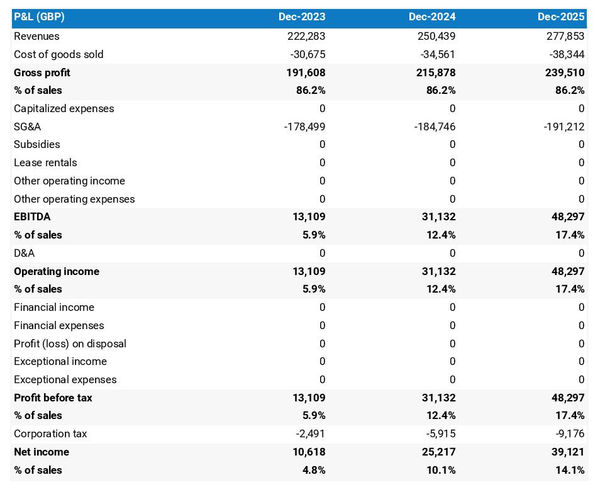
A healthy management consulting firm's P&L statement should show:
- Sales growing at (minimum) or above (better) inflation
- Stable (minimum) or expanding (better) profit margins
- A healthy level of net profitability
This will of course depend on the stage of your business: numbers for an established management consulting firm will look different than for a startup.
The projected balance sheet
Your management consulting firm's forecasted balance sheet enables you to assess your financial structure and working capital requirements.
It is composed of three types of elements: assets, liabilities and equity:
- Assets: represent what the business owns and uses to produce cash flows. It includes resources such as cash, equipment, and accounts receivable (money owed by clients).
- Liabilities: represent funds advanced to the business by lenders and other creditors. It includes items such as accounts payable (money owed to suppliers), taxes due and loans.
- Equity: is the combination of what has been invested by the business owners and the cumulative profits and losses generated by the business to date (which are called retained earnings). Equity is a proxy for the value of the owner's stake in the business.
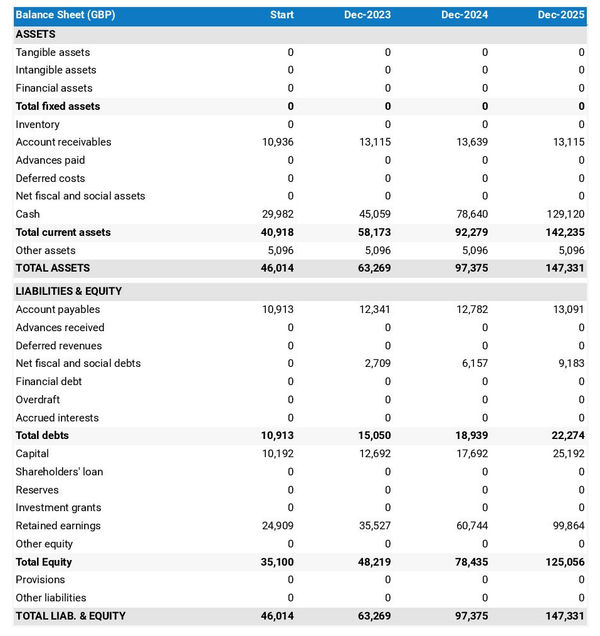
The cash flow forecast
Your management consulting firm's cash flow forecast shows how much cash your business is expected to consume or generate in the years to come.
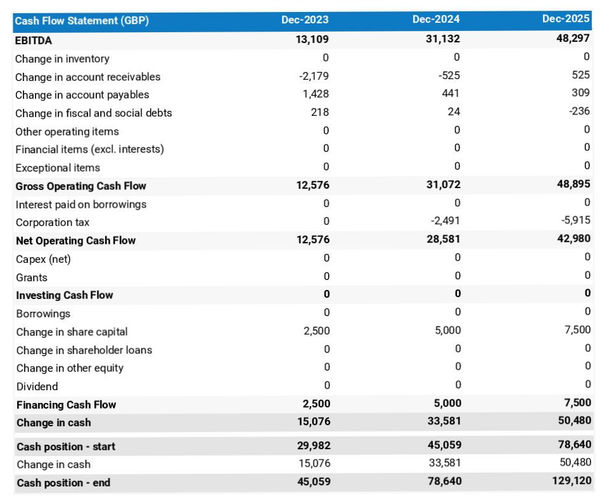
It is best practice to organise the cash flow forecast by nature to better explain where cash is used or generated by the management consulting firm:
- Operating cash flow: shows how much cash is generated by the operating activities
- Investing cash flow: shows how much will be invested in capital expenditure to maintain or expand the business
- Financing cash flow: shows if the business is raising new capital or repaying financiers (debt repayment, dividends)
Keeping an eye on (and regularly updating) your management consulting firm's cash flow forecast is key to ensuring that your business has sufficient liquidity to operate normally and to detect financing requirements as early as possible.
If you are trying to raise capital, you will normally be asked to provide a monthly cash flow forecast in your management consulting firm's financial plan - so that banks or investors can assess seasonal variation and ensure your business is appropriately capitalised.
Need a convincing business plan?
The Business Plan Shop makes it easy to create a financial forecast to assess the potential profitability of your projects, and write a business plan that’ll wow investors.

Which tool should you use to create your management consulting firm's financial forecast?
Using the right tool or solution will make the creation of your management consulting firm's financial forecast much easier than it sounds. Let’s explore the main options.
Using online financial forecasting software to build your management consulting firm's projections
The modern and easiest way is to use an online financial forecasting tool such as the one we offer at The Business Plan Shop.
There are several advantages to using specialised software:
- You can easily create your financial forecast by letting the software take care of the financial calculations for you without errors
- You have access to complete financial forecast templates
- You get a complete financial forecast ready to be sent to your bank or investors
- You can easily track your actual financial performance against your financial forecast, and recalibrate your forecast as the year goes by
- You can create scenarios to stress test your forecast's main assumptions
- You can easily update your forecast as time goes by to maintain visibility on future cash flows
- You have a friendly support team on standby to assist you when you are stuck
- It’s cost-efficient and much cheaper than using an accountant or consultant (see below)
If you are interested in this type of solution, you can try our projection software for free by signing up here.
Hiring a financial consultant or chartered accountant
Hiring a consultant or chartered accountant is also an efficient way to get a professional management consulting firm financial projection.
As you can imagine, this solution is much more expensive than using software. From experience, the creation of a simple financial forecast over three years (including a balance sheet, income statement, and cash flow statement) is likely to start around £700 or $1,000 excluding taxes.
The indicative estimate above, is for a small business, and a forecast done as a one-off. Using a financial consultant or accountant to track your actuals vs. forecast and to keep your financial forecast up to date on a monthly or quarterly basis will naturally cost a lot more.
If you choose this solution, make sure your service provider has first-hand experience in your industry, so that they may challenge your assumptions and offer insights (as opposed to just taking your figures at face value to create the forecast’s financial statements).
Why not use a spreadsheet such as Excel or Google Sheets to build your management consulting firm's financial forecast?
Creating an accurate and error-free management consulting firm financial forecast on Excel (or any spreadsheet) is very technical and requires both a strong grasp of accounting principles and solid skills in financial modelling.
Most entrepreneurs lack the expertise required to create an accurate financial forecast using spreadsheet software like Excel or Google Sheets. As a result, it is unlikely anyone will trust your numbers.
The second reason is that it is inefficient. Building forecasts on spreadsheets was the only option in the 1990s and early 2000s, nowadays technology has advanced and software can do it much faster and much more accurately.
This is why professional forecasters all use software. With the rise of AI, software is also becoming smarter at helping us detect mistakes in our forecasts and helping us analyse the numbers to make better decisions.
Finally, like everything with spreadsheets, tracking actuals vs. forecasts and updating your forecast as the year progresses is manual, tedious, error-prone, and time-consuming. Whereas financial forecasting software like The Business Plan Shop is built for this.
Need a convincing business plan?
The Business Plan Shop makes it easy to create a financial forecast to assess the potential profitability of your projects, and write a business plan that’ll wow investors.

Use our financial forecast templates for inspiration
The Business Plan Shop has dozens of financial forecast examples available.
Our templates contain both a financial forecast and a written business plan which presents, in detail, the company, the team, the strategy, and the medium-term objectives.
Our templates are a great source of inspiration, whether you just want to see what a complete business plan looks like, or are looking for concrete examples of how you should model financial elements in your own forecast.
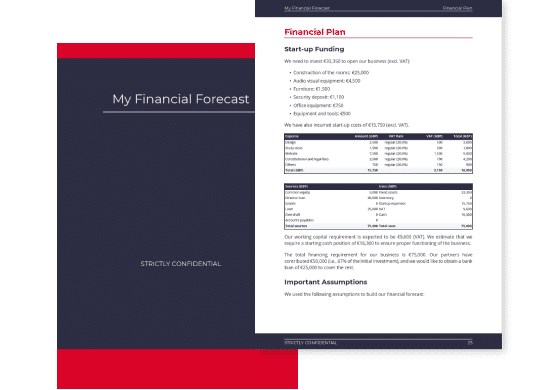
Takeaways
- Having a financial forecast enables you to visualise the expected growth, profitability, and cash generation for your business over the next three to five years.
- Tracking actuals vs. forecast and keeping your financial projections up-to-date is the only way to get a view on what your management consulting firm future cash flows may look like.
- Using financial forecasting software is the mordern and easy way to create and maintain your forecasts.
This is the end of our guide on how to build the financial forecast for a management consulting firm, we hope you found it useful. Don't hesitate to contact us if you want to share your feedback or have any questions.
Need a convincing business plan?
The Business Plan Shop makes it easy to create a financial forecast to assess the potential profitability of your projects, and write a business plan that’ll wow investors.

Also on The Business Plan Shop
- Example of financial forecast
- How to project revenues for a business?
- Financial forecast template for a business idea
Know someone who owns or is thinking of starting a management consulting firm? Share our forecasting guide with them!




